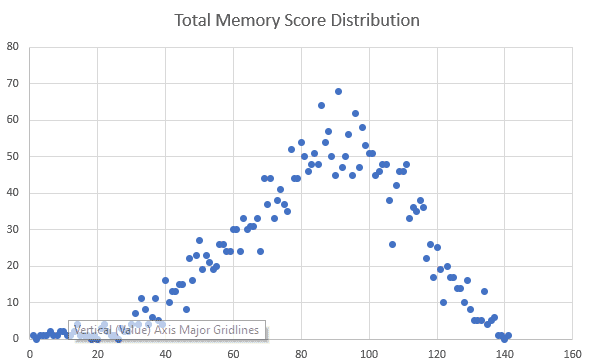Memory Test
3 Min Free Memory Test
Who Can Benefit From This Memory Test?
This memory test can be beneficial for anyone who is interested in assessing their memory function. Memory is an essential cognitive ability that plays an important role in many aspects of life, including learning, work, and personal relationships.
Individuals who are experiencing difficulties with memory, such as forgetfulness, difficulty retaining information, or difficulty recalling past events, may find this test particularly helpful in identifying areas for improvement. Additionally, those who are interested in personal growth and development may find the results of this test useful for identifying strategies to improve their memory function.

Memory Test Accuracy

The accuracy of a memory test can vary depending on several factors, including the specific test used, how the test is administered, and the individual taking the test.
Memory tests are designed to assess various aspects of memory function, such as working memory, short-term memory, and long-term memory. While these tests can provide a useful starting point for individuals who want to assess their memory function, it’s important to recognize that no single test can fully capture all aspects of memory.
Additionally, it’s important to consider that self-report measures, such as memory tests, may be influenced by factors such as social desirability bias, meaning that individuals may respond in a way that they think is socially desirable rather than providing accurate information about their true thoughts and behaviors.
Types of Memory Test
Wechsler Memory Scale (WMS):
This is a widely used memory test that assesses various aspects of memory function, including visual, verbal, and working memory. It consists of several subtests that measure different types of memory.
California Verbal Learning Test (CVLT):
This test assesses verbal learning and memory by measuring the ability to learn and recall a list of words over several trials.
Rey-Osterrieth Complex Figure Test:
This test assesses visual memory and spatial perception by measuring the ability to reproduce a complex geometric figure from memory.
Digit Span Test:
This test assesses working memory by measuring the ability to hold and manipulate information in memory. Participants are asked to repeat a sequence of digits in either forward or reverse order.
Benton Visual Retention Test:
This test assesses visual memory by measuring the ability to reproduce a series of visual patterns from memory.
Rivermead Behavioral Memory Test:
This test assesses everyday memory function by measuring the ability to remember and recall various types of information, such as names and addresses, after a delay.
Treating Issues related to Memory
Treating issues related to memory can involve various strategies depending on the underlying causes and individual needs. Here are a few suggestions:
- Establishing healthy habits: Maintaining healthy habits, such as getting enough sleep, eating a nutritious diet, and engaging in regular exercise, can help improve memory function.
- Memory strategies: Developing memory strategies, such as using mnemonics or visualization techniques, can help improve memory function and recall.
- Minimizing distractions: Minimizing distractions in the environment, such as noise or clutter, can help improve focus and concentration, which can in turn improve memory function.
- Mindfulness practices: Mindfulness practices, such as meditation or deep breathing exercises, can help reduce stress and improve focus, which can in turn improve memory function.
- Memory training: Participating in memory training programs, such as cognitive rehabilitation therapy, can help improve memory function and recall.
- Medication: In some cases, medication, such as cholinesterase inhibitors or memantine, may be prescribed to help manage symptoms related to memory impairment.

